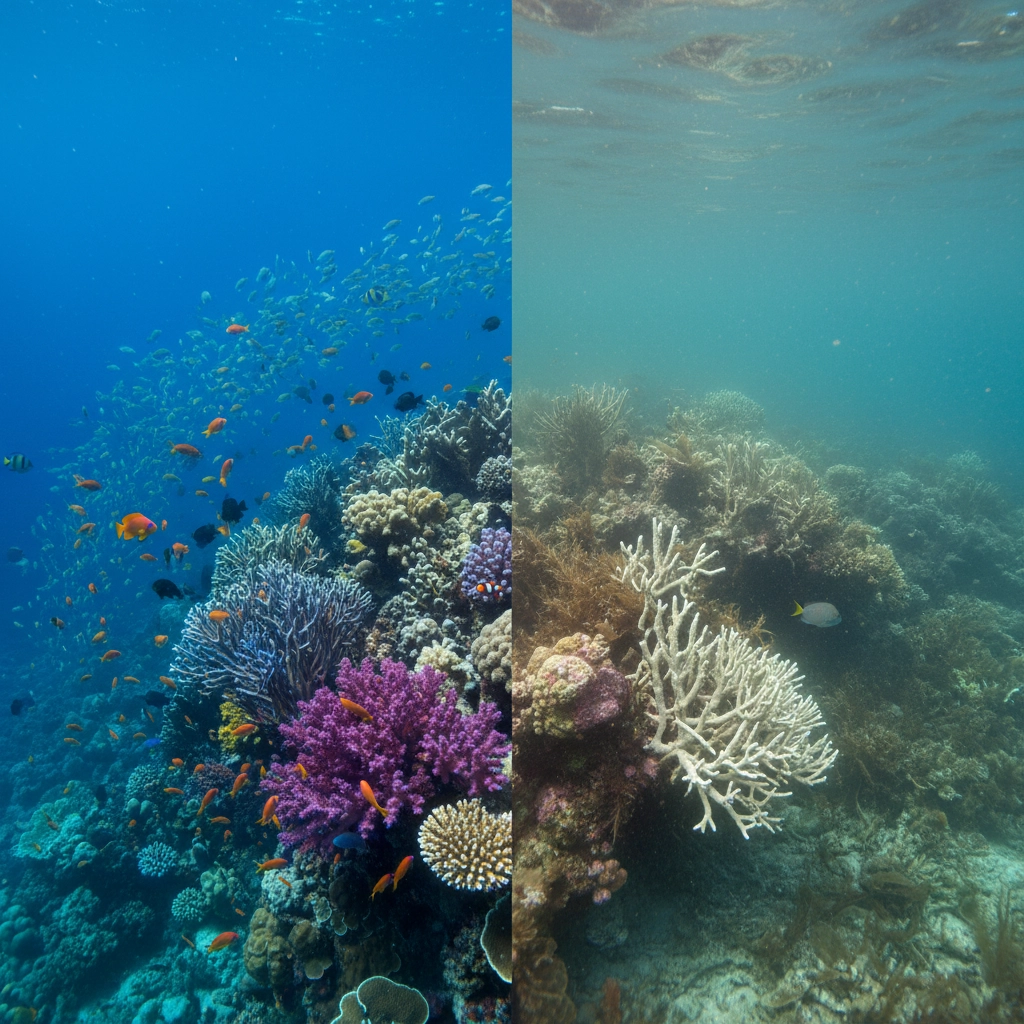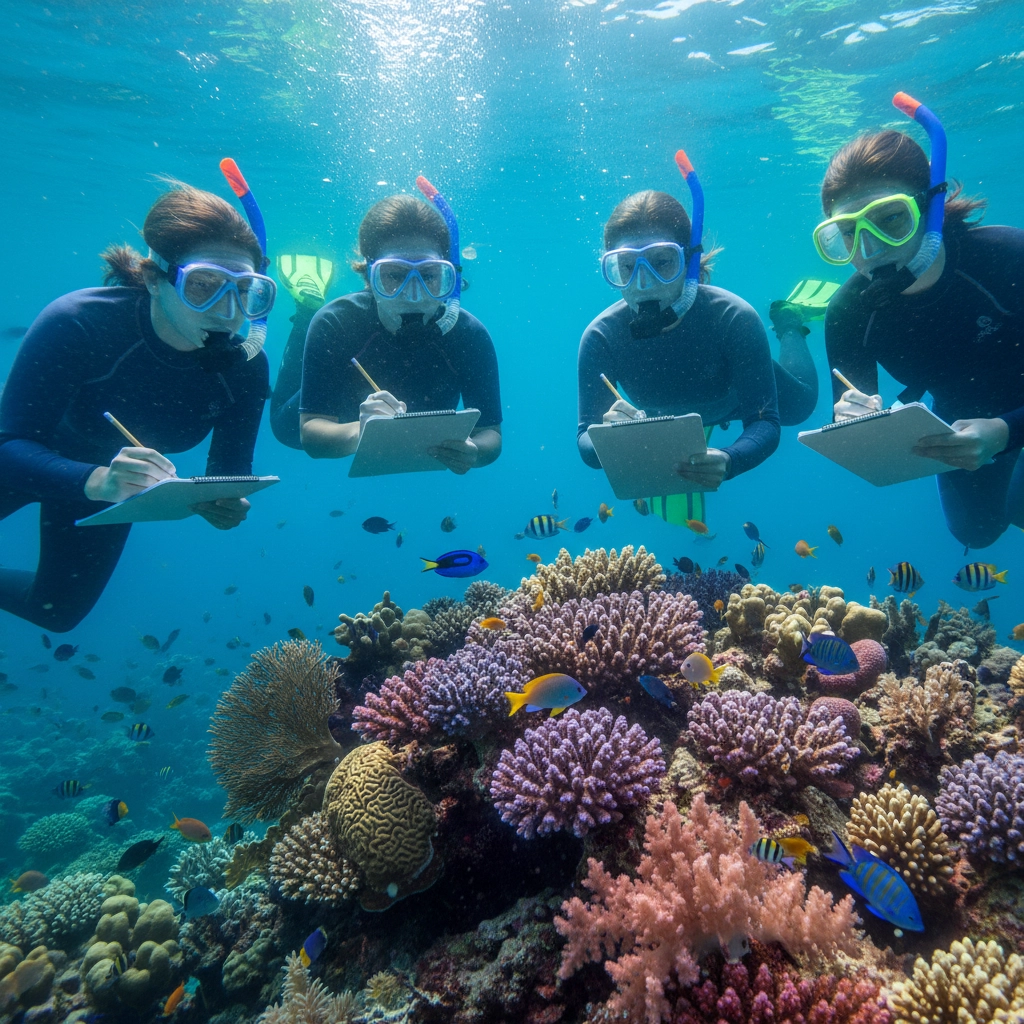Coral Reefs: Rainforests of the Sea and Their Disappearance
- Caleb Mullenix
- Oct 22, 2025
- 5 min read
Understanding coral reefs as the "rainforests of the sea" represents one of the most critical marine biology concepts students can explore during educational expeditions to the Florida Keys. These underwater ecosystems demonstrate extraordinary biodiversity, ecological complexity, and environmental significance that parallels terrestrial rainforests in their species richness and global importance. For educators planning marine science expeditions, coral reef studies provide unparalleled opportunities to engage students in hands-on conservation learning while witnessing firsthand one of Earth's most threatened ecosystems.
Why Coral Reefs Earn Their Rainforest Designation
Coral reefs have rightfully earned their designation as marine rainforests through their remarkable ability to support incredible biodiversity within relatively small areas. Despite occupying less than one percent of the ocean floor, coral reef ecosystems provide essential habitat for at least 25 percent of all known marine species. Students participating in marine science trips to the Florida Keys will observe this extraordinary concentration of life firsthand, encountering more than one million animal and plant species within these living limestone structures.
The comparison extends beyond simple species counts to encompass the complex ecological relationships that define both ecosystems. Educational travel experiences in the Florida Keys allow students to witness how tiny coral polyps extract calcium from seawater and combine it with carbon dioxide to construct elaborate limestone skeletons. These structures create countless microhabitats that support remarkable diversity, from tiny sergeant majors to giant barracudas, demonstrating the intricate web of dependencies that characterize healthy reef systems.

Ecological Functions and Educational Value
Marine science expeditions to the Florida Keys provide students with direct observation opportunities to understand how coral reefs function as foundational ecosystems. Students will observe how reefs provide food, shelter, resting areas, and breeding grounds for millions of species including sea turtles, dolphins, and countless fish species. These educational travel experiences demonstrate how the physical complexity of coral formations creates the microhabitats necessary to support such extraordinary biodiversity.
Advanced students can explore how coral reefs influence broader ecosystem formation. The grazing activities of parrotfish on coral formations create extensive sand areas, which through current action form shallows and islands. These processes ultimately enable the formation of mangroves and other coastal forests, illustrating how coral reefs serve as catalysts for other critical marine and coastal habitats. Wildlife conservation student travel programs emphasize these interconnected relationships to help students understand ecosystem complexity.
Critical Ecosystem Services Students Must Understand
Educational expeditions to the Florida Keys must emphasize the vital ecosystem services that coral reefs provide globally. Coral reefs contribute ecosystem services valued at more than four billion dollars worldwide, with these values increasing substantially during major storm events. Students will observe how the physical structure of coral reefs creates natural breakwaters that absorb wave energy and reduce coastal erosion.
Marine science trip participants in the Florida Keys gain direct experience with reefs that protect coastlines from wave damage, flooding, and erosion caused by storms and hurricanes. As sea levels rise, these reef structures help reduce incoming wave size, keeping coastal flooding to manageable levels. Students studying these protective functions develop understanding of how natural systems provide essential services that would otherwise require expensive human-engineered solutions.
The carbon sequestration functions of coral reef ecosystems provide another critical learning opportunity. Students will study how coral reefs protect inshore habitats like seagrass meadows and mangroves, which absorb carbon dioxide from the atmosphere and store it up to fifty times more efficiently than terrestrial forests. These carbon sinks demonstrate how coral reefs contribute directly to climate change mitigation efforts.

The Crisis Threatening Coral Reef Survival
Marine science expeditions to the Florida Keys must address the unprecedented ecological catastrophe currently facing coral reef systems. Students will learn that more than half of the world's coral reefs have already been lost to climate change, with the Caribbean losing more than 80 percent of its corals. Educational travel experiences must emphasize the urgency of this situation while inspiring students to engage in conservation efforts.
Climate change represents the most significant threat to coral reef survival, though students will study multiple additional stressors during their Florida Keys expeditions. Rising ocean temperatures cause coral bleaching events, with sea temperature changes of merely one degree Celsius capable of causing substantial coral mortality. Students will observe evidence of bleaching events and learn how these temperature fluctuations stress coral organisms beyond their survival limits.
Ocean acidification provides another critical learning focus for student groups studying coral reefs. Increasing levels of carbon dioxide in seawater create carbonic acid, making it more difficult for corals to build their calcium carbonate skeletons. Students will understand how this process forces corals to expend more energy on skeleton construction, resulting in slower growth rates that prove extremely problematic when reefs need to regenerate after disturbances.
Student Observations of Reef Decline
Wildlife conservation student travel programs in the Florida Keys provide direct opportunities to observe coral reef decline and understand its implications. Students will study research indicating that coral reef productivity has declined by half since the 1950s, representing a dramatic reduction in the capacity of these ecosystems to provide the services upon which millions of people depend globally.
Educational expeditions must help students understand the multiple stressor environment that coral reefs face. Beyond climate-related threats, students will examine how pollution, industrial activities, overfishing, siltation, and physical damage from human activities contribute to reef decline. Marine science trip participants will observe how the combination of these stressors creates conditions where even healthy reef systems require decades to recover from disturbances.

Consequences of Coral Reef Loss for Future Generations
Students participating in marine science expeditions must understand the cascading consequences that coral reef loss would trigger. The disappearance of habitat for 25 percent of marine life would create domino effects throughout ocean ecosystems, with countless fish, sea turtles, and other marine creatures losing essential food sources, shelter, and spawning grounds. This biodiversity collapse would represent irreversible transformation of ocean ecosystems on a global scale.
Educational travel experiences in the Florida Keys must emphasize human consequences of coral reef loss. Students will learn that hundreds of millions of people worldwide would lose their main sources of food and income if coral reefs disappear. Coastal fishing industries would collapse, creating food security crises for communities that have depended on reef-associated fisheries for generations.
Coastal communities face dramatically increased vulnerability to storms, flooding, and erosion without the natural protective barriers that coral reefs provide. Students will understand that without reefs, coastal areas would need substantial infrastructure investments to prevent flooding and erosion, costs that many vulnerable communities cannot afford.
Conservation Action and Student Engagement
Marine science expeditions to the Florida Keys must inspire students to engage in coral reef conservation efforts. Educational travel experiences should emphasize how individual and collective actions can contribute to reef protection and restoration. Students will learn about successful coral restoration projects and understand how scientific research continues to develop new approaches to reef conservation.
Wildlife conservation student travel programs should connect students with ongoing research and restoration efforts in the Florida Keys. Students can observe coral nurseries, participate in reef monitoring activities, and understand how citizen science contributes to reef conservation. These hands-on experiences demonstrate how young people can contribute meaningfully to conservation efforts while developing scientific skills and environmental awareness.
Preparing Future Marine Conservationists
Educational expeditions to coral reef ecosystems in the Florida Keys provide transformative learning experiences that can inspire lifelong commitment to marine conservation. Students who observe the extraordinary biodiversity and beauty of healthy coral reefs, while simultaneously understanding the urgent threats these ecosystems face, develop the knowledge and motivation necessary to become effective environmental stewards.
Marine science trip participants return from Florida Keys expeditions with comprehensive understanding of ecosystem complexity, species interdependence, and conservation urgency. These educational travel experiences provide the foundation for advanced study in marine biology, environmental science, and conservation biology while inspiring students to pursue careers dedicated to protecting marine ecosystems for future generations.



Comments